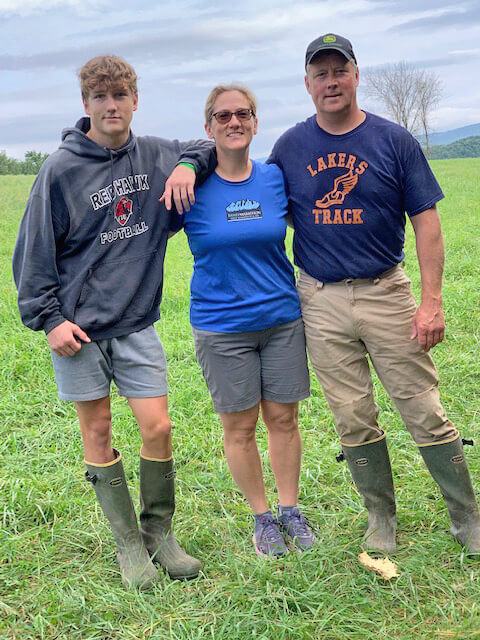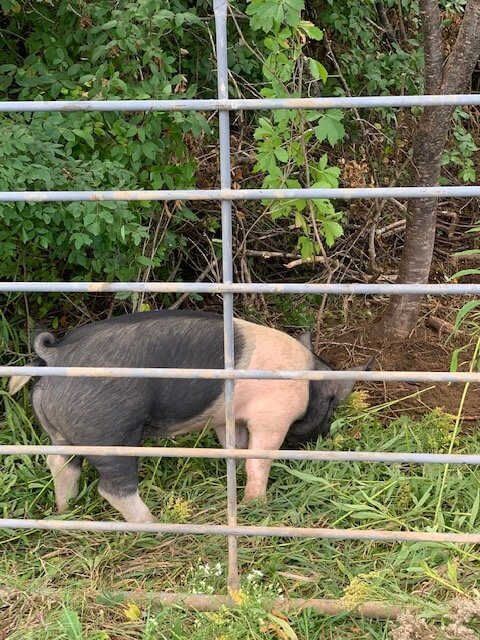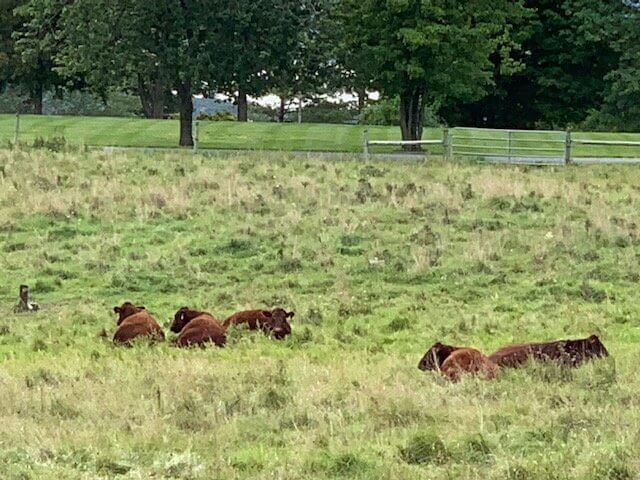High Hedge Farms sets a high bar for humane, sustainably raised beef and pork
In the changing world of agriculture, new farmers are bringing exceptional creativity to one of the world’s oldest endeavors. Bruno and Tara Murphy, owners since 2016 of the 165-acre High Hedge Farm in East Charlotte, embody that new trend perfectly: people with earlier careers for whom a commitment to ethical and sustainable practices is a driving force behind their choice to take up farming.

The couple met in the 1990s when they both worked at Proctor and Gamble in Pennsylvania. They married and started their family there, but in subsequent years moved 13 times to support Tara’s career. A mechanical engineer by training, her trajectory took her to Green Mountain Coffee Roasters, then to Vermont Smoke & Cure, and now, at the age of 48, to the helm of Bee’s Wrap, a Middlebury company that makes reusable food wraps as an alternative to plastic.
It was Bruno, 49, whose mother once raised goats, who always wanted to farm. Inspired, among other things, by Forrest Pritchard’s book, Gaining Ground: A Story of Farmers’ Markets, Local Food, and Saving the Family Farm, the couple eventually returned to Charlotte, where they had lived earlier, bought the farm, and then acquired a herd of Rotokawa Devon cattle. The New Zealand breed, prized for its tender meat, is uncommon in the United States, in part because it doesn’t do well on feed lots. But it’s a distinguishing feature of High Hedge Farm, along with pasture-raised hogs and honey from their own bees. Bruno, largely self-taught through books and trial and error, runs the farm day to day and ensures that everything is raised, as he puts it, “in a way that benefits not only the land but the animals as well.”
Their seven Duroc/Hampshire cross hogs, down from 20 last year, along with 35 head of cattle, are the lifeblood of High Hedge Farm. The animals are humanely raised, the cattle are 100 percent grass-fed and finished, and the yield from both breeds is marbled, tender and flavorful beef and pork. “It’s quality over quantity with us,” Bruno says. “It’s respect for the life of the animals. You can raise them on feedlots or you can give them good lives like this. When you give them a good life, I feel good about keeping the animals and also the results.”

As if to illustrate that point, this afternoon, while the cattle are currently grazing on lush pastures throughout Charlotte, the hogs are squealing happily on the farm in the open air. Bruno and Tom, the Murphys’ 15-year-old son, create a new paddock by moving temporary fencing and then direct the pigs into a new section of densely overgrown hedgerow filled with invasive species like buckthorn, Asian honeysuckle and wild grapes. It’s part of Bruno’s plan to regenerate and reclaim overgrown parts of the farm. Over the course of several years, he and the animals have transformed the land, which hadn’t been farmed for over 40 years. The hogs move in eagerly and, like heavy machinery, begin pulling down vines and breaking up the soil with their constant rooting. In this symbiotic process, the Murphys gain more pasture for winter hay for their animals and the hogs enjoy a degree of freedom and togetherness that feedlots don’t offer, as well as a richly varied diet that includes nuts, apples and berries, all of which lend a superior taste to their meat.
As you would expect, the couple are enthusiastic meat eaters, and it is their insistence on a gourmet eating experience, coupled with their commitments to humane treatment and the environment, that inform how the animals are bred and raised. “Meat raised without the use of antibiotics or hormones, that’s so important,” Tara points out. “If everybody could just do a little more…we could alleviate some of the whole [environmental] problem.”
Demand for their beef and pork—sold primarily at the Shelburne farmers market and direct to customers who contact them—is high. It draws repeat customers like Lisa and Bob Downing, who praise not only the superior taste of the Murphys’ meat, but the couple’s philosophy of raising their animals. “To be honest, we would not buy meat that was not sustainably and humanely raised,” Lisa Downing says. “We wouldn’t go to the supermarket.”

The Murphys recently bought half a pig and half a steer, which holds the cost of the meat down and eliminates waste, but also keeps the supply tight. “We could have sold three times as many pigs this year,” Bruno acknowledges, but he won’t do that because it would impact the quality of the hogs’ life.
The cattle enjoy a similarly free-range lifestyle before all the animals are eventually sent to a slaughterhouse in the Northeast Kingdom. Bruno rotates the herd among a number of pastures, including leased ground on nearby farms, a practice that he says is good for everyone. “It is nice to help the other landowners take care of their properties. They don’t have animals so it’s really beneficial for both parties.” In the cold months, the livestock is fed on the high-quality hay that Bruno grows on their own and leased fields.
Continuing to return their farm to productivity is part of the couple’s shared vision. They derive great satisfaction from improving their pastureland, planting wildflower meadows for the bees, rebuilding derelict barns, and reconstituting old stone walls that crisscross the farm. Whenever possible, they work as a team and as a family and relish that. “Other women on Saturday afternoon are shopping on Church Street, they’re not moving pigs with you,” Tara says playfully.
“There’s always a protest about getting chippers on Saturdays,” Bruno parries with a smile, referring to the work still to be done once the pigs move on to new sections of hedgerow. But obviously, there’s nothing else they’d rather be doing.
Contact: High Hedge Farm or call Bruno Murphy at 373-8378.
